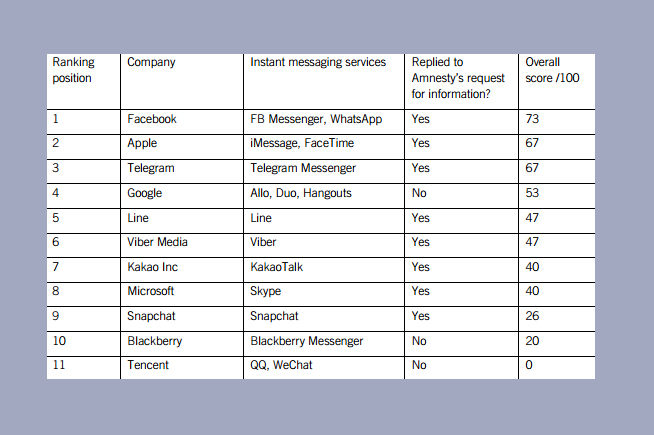Research conducted on messaging apps highlights problems for Snapchat and Microsoft and rewards WhatsApp and Messenger. Google in limbo
Encryption is a human right. To say it is not the activist on duty, but Amnesty International that in its latest research "For your eyes only?" has analyzed the way in which eleven major companies working in the field of instant messaging protect the privacy of users.
From Facebook, to Google, passing through Microsoft and Snapchat, all the most important applications in the sector have come under the lens of the researchers of Amnesty International. L’organizzazione non governativa internazionale ha analizzato le app seguendo cinque criteri: se riconoscono nelle policy aziendali le minacce online come un rischio per le libertà degli utenti, se utilizzano la crittografia end-to-end di default, se rendono consapevoli gli utenti dei rischi che corrono online, se forniscono i dati degli utenti al governo e se pubblicano i dettagli tecnici dei loro sistemi di crittografia.
La classifica
 Fonte foto: Amnesty International
Fonte foto: Amnesty International
La classifica delle applicazioni di messaggistica istantanea più sicure
Per ogni criterio è stato assegnato un massimo di 3 punti e i risultati sono stati poi riportati in una classifica in cui il massimo raggiungibile era un punteggio di 100. In total, there were 16 applications analyzed and the ranking is led by Facebook Messenger and WhatsApp which received a score of 73, followed by FaceTime, iMessage and Telegram with 67. Of these applications, however, the only one that tells users when end-to-end encryption is not being used, currently the highest standard for protecting people's privacy, is WhatsApp. In addition, the instant messaging app purchased by Facebook for 19 billion, has recently introduced the Open Whisper System protocol the same used by Signal, for many the safest app for chatting with friends (it has not been considered by Amnesty as the owners are not a technology company but a non-profit).
Who comes out with broken bones
If Facebook and Apple can be quite satisfied with the results obtained, the same cannot be said for Google (in fourth position with Duo, Allo and Hangouts, but which only receives a score of 53), Skype, Snapchat and Tencent. The last three above all do not offer any kind of end-to-end encryption to their users (for those who do not know Tencent, it is a Chinese company that has developed QQ and We Chat, applications used by almost 1 billion users). According to the international organization, ensuring an encryption system to its users is fundamental for the security of personal data. In those nations where every day people's rights are not respected and dissidents are persecuted, offering an end-to-end encryption system allows in some way to safeguard their personal security. Amnesty concludes in its report that technology companies have an obligation to respect human rights and ensure that they do not contribute to endangering users' right to privacy and freedom of expression.
